Victorian Walnut Cased Miniature Wheel Barometer By Riddel & Co Belfast
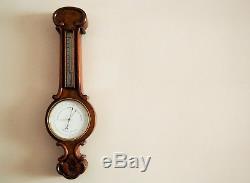
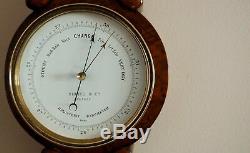
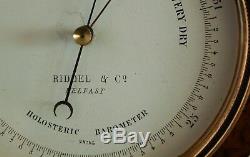
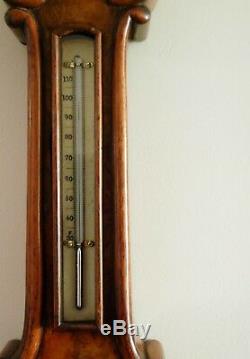
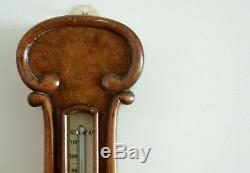
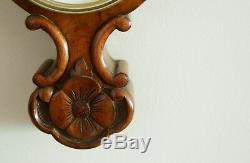
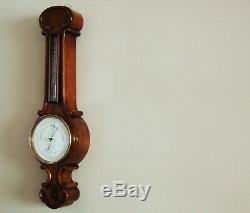

For sale, a Victorian walnut cased miniature aneroid wheel barometer by Riddel & Co of Belfast. This rare version of an aneroid barometer measures just 52cms high and 15cms wide and is comprised of a solid walnut body with suspension loop to the back and the front with carved C scroll detail and floral motif to the base. The neck contains a Fahrenheit thermometer with a 5 inch dial brass cased aneroid barometer inset into the main body. Pertuis, Naudet, Hulot & Bourgeois (PNHB) and the back of the case when removed from the body is stamped with the makers stamp of PNHB as would be expected. The dial has the typical early barometer weather conditions from Stormy to Very dry and it measures from 25 to 31 inches of barometric pressure. Under the blue steel pointer and the brass pointer, the dial is marked with the retailers name of Riddel & Co, Belfast. The retailer of this super piece, Riddel & Co Ironmongers, is unusual as they are ordinarily marked to opticians or other scientific manufacturers. The company however, were a significant retailer of ironmongery and other household effects in Belfast from 1803 and continue to trade today under the name of Riddels. The firm of Riddel & Co was initially founded by William Riddel in Donegal Place, Belfast.
Riddels daughter Mary married the doctor Samuel Musgrave and the combination of these two significant Irish families was to create one of the most profitable Northern Irish business empires of the Victorian period. Upon the death of William Riddel, his son John Riddel (1783 1870) and sons of Mary Musgrave (nee Riddel) Robert Hamilton & John Riddel Musgrave formed a partnership which by now had further premises at 54 High Street. In 1843, alongside their brother James, the Musgrave brothers Robert & John, founded Musgrave Brothers which presumably excluded their uncle John Riddel but the two firms seem to have co-habited the same industry profitably with the latter company focusing on the manufacture of cast iron stoves after the death of Robert in the 1860s.
By this time Riddel was prosperous enough to require a separate warehouse alongside its retail concern and the architect firm Thomas Jackson & Son were commissioned to undertake the task on a site in Ann Street. This superb Victorian building still exists today and is currently being renovated back to its former glory. Unsurprisingly, the Musgraves business also had an iron works and foundry located in the same area. Upon the death of John Riddel in 1870, the Musgrave family inherited the full rights to the business and this transcription from an 1880 advert provides a good idea of its general and varied stock.
Donegall Place and Fountain Street, Belfast. Manufacturing and House Furnishing Ironmongers, Architectural Iron Workers and Manufacturers of every description of ART METAL WORK, Iron Conservatories, Vineries, Entrance Gates, Railings, Balconies, Porticos, Finials, Crestings, Grilles etc. Hydraulic and Gas Engineers, public Buildings warmed by Hot Water, Hot Air or Steam.Plumbers, Gas Fitters, Bellhangers, Copper, Brass, Zinc and Tin Workers. Makers of the celebrated ECONOMIC COOKING RANGES, Patent Economic Slow Combustion Stoves. Experienced persons sent to receive instructions, take dimensions and give quotations. Manufacturers and Sole Traders for Ireland of LANYON'S Patent Ventilating Apparatus, for the extraction of Vitiated Air, Noxious Gases etc, from Kitchens, Ranges, Water Closets, Slop Basins, Sinks, Cesspools etc. Manufacturers of Lanyon's Patent Pan-Valve Water Closets.
Riddel & Company's Patent Stable Fittings, Cow-House Fittings, Iron Piggeries. An Illustrated Catalogue specially representing same sent on application. Agents for : Maw & Minton's Encaustic Pavements, Chimney Pieces in Italian and British Marbles, Enamelled Slate Chimney Pieces, Fire and Burglar Proof Safes, Agricultural Implements of all kinds, Bradford's Washing and Weighing Machines, Bradbury's Celebrated Lock-Stitch Sewing Machines, available for all classes of work.
The Musgrave family are synonymous with Belfast and were generous benefactors to the area and its development in the nineteenth century. John Riddel Musgrave was a Justice of the Peace for Belfast and Deputy Lieutenant of Donegal, James, later Sir James Musgrave also held the same positions and was knighted for his schemes and developments to the Port of Belfast and for whom the Musgrave Channel is named. Perhaps the most famous of the brothers involved in the familys business undertakings was Henry Musgrave for whom Musgrave Park is named. Apart from taking the positions of a Justice of the Peace for Belfast and Deputy Lieutenant of Donegal, he was also a grand juror and was made an honorary burgess of the City of Belfast in 1917.
Both the Riddels and the Musgraves also had a long association with charity and education. As is made obvious from the above, the Riddel family largely ceased to exist through the lack of heirs but the last two remaining sisters (both spinsters upon their deaths) used their part of the Riddel fortune to build Riddel House which was to be used for the education of women. It was later bequeathed through the Musgraves to Queens University where it remains as part of their estate to this day. Pertuis, Naudet, Hulot & Bourgeois (PNHB). The company was formed in 1860 by the above named partners and they quickly rose to become one of the largest manufacturers and exporters of aneroid barometers in the world.
Their early export success may be related to their exhibiting at the 1862 London Exhibition where they are listed under Volume 3 The Colonial & Foreign Division and it is likely that the company garnered numerous business relationships as a result. Examples of their barometers are numerous amongst the wares of all of the best scientific instrument makers of the day. Negretti & Zambra were also importing and retailing the companys barometers as well as making their own. Interestingly, the company was listed at the exhibition as Naudet & Co (Cie in French), so it is also likely that the initial partnership was broken up in some way within two years, leading to the convenient (for Naudet at least) belief that the PNHB makers stamp really stood for Paul Naudet Holosteric Barometre.However, there are a number of confusing factors that suggest that not all partners left the concern. In 1867, Naudet, Hulot & Cie are referenced in the, Bulletin de la Societe DEngouragement pour LIndustrie Nationale after receiving a medal for their enhancements to Monsieur Vidies design (the patent had fallen into the public domain in 1859) through their Holosteric Barometers.
The companys 1891 catalogue continued to reference this award, printing the Societys report in full but at this stage, the catalogue states the business name as, Naudet & Cie but with the line below stating Pertuis & Fils in larger text proving that Pertuis also continued to have a stake in this highly successful enterprise. We can only surmise at this stage but it would suggest that Hulot and Pertuis maintained some kind of relationship with Naudet until the end of the Nineteenth Century and Bourgeois was the only partner to have left the company in its the early period. It is certain however that further research is required to untangle this complicated partnership arrangement. Survival of the company through the Franco Prussian war and the First World War is evidenced through the existence of their catalogues but in 1928 it seems that the company had moved out of the original owners hands and had been bought out by a company named Dourde. Like many English scientific instrument makers, the new owners had sought to maintain the goodwill and customer base built up by Naudet and their catalogues front page is dual named to Maison Naudet and Dourde successeur. Unlike many of its kind, Naudet (or Naudet Dourde) still exists and continues to make new barometers today even winning the Enterprise du Patrimoine Vivant award in 2016. They primarily trade under the Naudet name, so much so that the Dourde name is not incorporated into their branding on their website or on their instruments.A testament to the strength of reputation that this company created in the Nineteenth Century. This interesting aneroid barometer is a rarity in itself and these versions are very rarely encountered. It also bears testament to two significant businesses of the nineteenth century from either side of the Channel both of which still exist today. Jason Clarke Antiques are happy to discuss carriage, condition or for any other queries, alternatively, you can also message me and I will endeavour to come back to you as soon as possible.
I have a number of beautiful antiques for sale, so please feel free to browse my other items. The item "VICTORIAN WALNUT CASED MINIATURE WHEEL BAROMETER BY RIDDEL & CO BELFAST" is in sale since Tuesday, August 21, 2018. This item is in the category "Collectables\Scientific Collectables\Scientific Instruments\Barometers". The seller is "jason750_1" and is located in newbury, Berkshire.
This item can be shipped to United Kingdom.
- Period: 1800 to 1900
- Sub-Type: Barometers
- Modified Item: No
- Country/Region of Manufacture: France
- Material: Brass
- Type: Scientific Instruments

